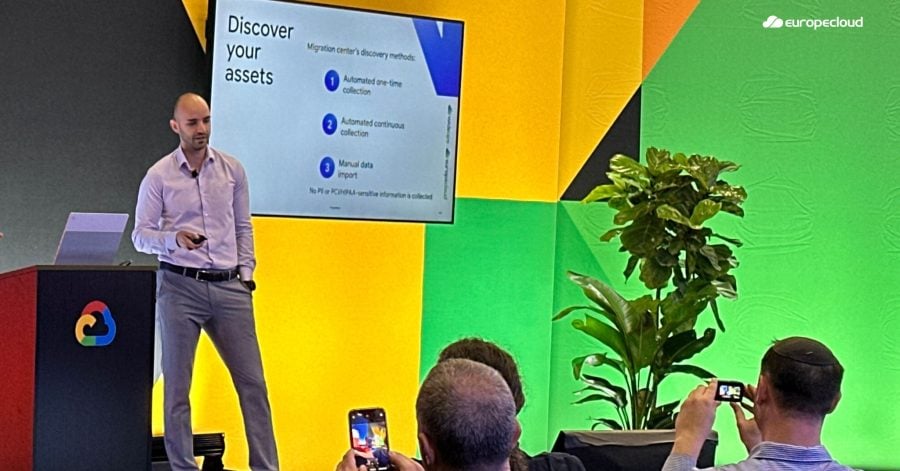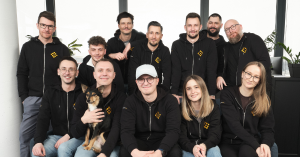A couple of weeks ago, Google Cloud Next ’24 in Las Vegas not only served as a convergence of minds from across the tech industry but also as a showcase for some of the most significant advancements in cloud computing and artificial intelligence to date. The event brought together over 30, 000 people and 2000+ Google experts. There was a Bulgarian presence at the event as well – with Aleksandar Aleksiev, Technical Team Lead at Europe Cloud, providing a deep exploration of cloud migration strategies.
The Recursive team talked to him and Europe Cloud’s Managing Director Jordan Mladenov to understand more about the latest in cloud migration and cloud infrastructure in general. Based on that conversation, in this article, we review the essential innovations and trends from the conference that seem set to redefine the technological and operational landscapes of numerous industries.
Cloud Migration Strategies: Move, Change, Replace
Aleksandar Aleksiev’s presentation provided a strategic framework for enterprises looking to harness the cloud’s full potential. The Move strategy is designed for businesses aiming for a swift cloud transition without extensive changes to their existing infrastructures, thereby minimizing risk. The Change strategy focuses on application modernization to enhance features like scalability and security, preparing legacy systems for a future in the cloud. Lastly, the Replace approach advocates for a clean slate or ‘greenfield’ development, pushing for cloud-native application builds from the ground up, thus optimizing new projects for cloud efficiency from day one.
“For example, In an improve and move migration, you modernize the workload while migrating it. In this type of migration, you modify the workloads to take advantage of cloud-native capabilities, and not just to make them work in the new environment. You can improve each workload for performance, features, cost, or user experience,” Aleksandar shared.
Cloud Innovations and GenAI News Curated by Europe Cloud at Google Next ’24
Transitioning from strategy to innovation, the conference also served as a platform for Google to unveil new tools and technologies poised to redefine the tech landscape. Here’s a look at the top innovations and trends that stood out according to the Europe Cloud team (out of all 218 things that were announced during the conference).
Vertex AI Agent Builder
One of the most exciting GenAI news was the introduction of Vertex AI Agent Builder, a product that accelerates the creation of high-quality generative AI experiences in just a few simple steps. This no-code console enables businesses and employees alike to be more productive, allowing for the training on use case specific enterprise data.
Gemini Code Assist
Bridging the gap between developers and their tools, the latest updates in Gemini Code Assist revolutionize how code is written and maintained. By enabling developers to interact with their codebases using natural language, this tool significantly simplifies debugging, enhancing code, and integrating new functionalities, which could lead to more intuitive development workflows.
Google Vids
Positioned as a comprehensive AI-driven media creation tool, Google Vids integrates seamlessly with other Google productivity tools. It’s designed to democratize video production, enabling professional-quality storytelling accessible to all professionals, which could transform corporate communications and marketing.
Gemini 1.5 Pro
Now in public preview, Gemini 1.5 Pro offers an unprecedented 1M context window, allowing developers to tackle complex coding projects with more contextually aware AI assistance. Alongside, Imagen’s capabilities to generate animated images from text promise to add a new dimension to content creation.
Gemini in Security Operations
To be available at the end of April, this tool would power up the investigation of security issues, summarizing events and guiding users through automated, intelligent conversational workflows. This tool could significantly enhance the responsiveness of security teams to threats.
AI for Better Customer Experience in Financial Services
Discover Financial provided a deep dive into how it is integrating generative AI within its customer contact centers. The initiative focuses on improving agent productivity by employing AI for personalized customer resolutions, intelligent document summarization, real-time search assistants, and enhanced self-service capabilities.
AI Innovations in Healthcare
Bayer announced its ambitious project to develop a cutting-edge radiology platform. The primary goal is to assist radiologists by improving the efficiency of diagnostic processes and reducing turnaround times for patient diagnoses. This initiative is expected to significantly advance medical imaging and diagnostics, leading to faster and more accurate patient care.
AI in Retail is also Enhancing Customer Interactions
Best Buy’s presentation highlighted its use of the Gemini large language model, part of Google Cloud’s suite of AI tools, to redefine customer service. The company is implementing generative AI virtual assistants that enhance how customers interact with the brand. These AI assistants are equipped to troubleshoot product issues, reschedule deliveries, and handle other customer needs more efficiently than ever before.
AI Enhancements in Google Workspace
Another significant announcement was the introduction of the new AI Meetings and Messaging add-on, designed to enhance communication and collaboration across global teams. This suite of tools includes several key features: “Take notes for me,” and “Translate for me,” set to launch in June, which will automatically detect and translate captions in Google Meet, supporting a broad linguistic range with 69 languages. The introduction of voice commands and instant email drafting tools in Gmail could redefine email communication, making it more accessible and efficient, especially for mobile users.
Google for Startups Accelerator: AI-First
The Google for Startups Cloud Program announced a new partnership with the NVIDIA Inception startup program, offering numerous benefits such as access to Google Cloud credits, go-to-market support, technical expertise, and fast-tracked onboarding to Google Cloud Marketplace. Additionally, the launch of the new Google for Startups Accelerator: AI-First program marks a significant initiative to support startups focused on developing AI solutions, providing them with essential resources and guidance to innovate and scale effectively.
As the landscape of cloud computing and AI continues to evolve, the insights and innovations presented at Google Next ’24 offer a glimpse into the future of these technologies. If you are interested in exploring how these advancements can impact your business or if you wish to discuss any of the topics covered, Europe Cloud is available to provide further information and support.








